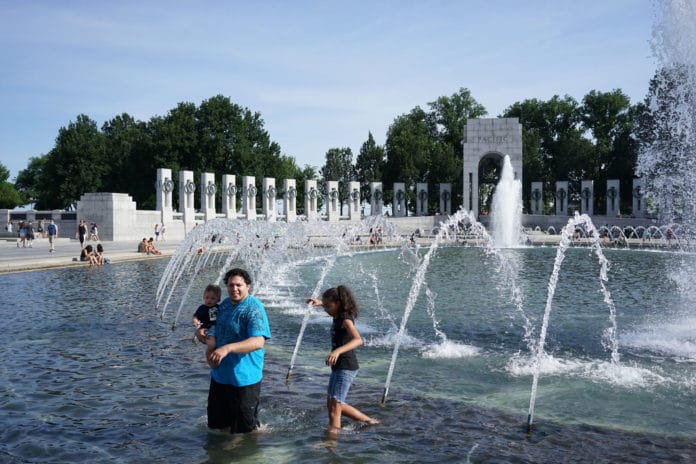WASHINGTON — The summer sun is blazing down, and at the National World War II Memorial, shade is hard to come by. You stare at the inviting pool, the jets of cool water spurting from the memorial’s fountain beckon you forward. Do you dip your toes in or, better yet, wade in for relief from the heat?
You could, but you would be violating National Park Service rules – as signs at the memorial clearly state. And, in the minds of some, it is also tacky and disrespectful.
Washington is a city of memorials – somber places where we reflect on who we are and those who have perished fighting for the nation’s ideals. It is also a city full of tourists on Segways and hordes of school kids in matching uniforms. Every day, those two worlds collide. How, exactly, is one supposed to strike the delicate balance between relaxed vacationing and respectful, dignified reflection?
On a recent Sunday afternoon, with the temperature in the high 80s, Eric Echevarria, 31, of Atlantic City, carried his toddler in his arms and waded several feet into the memorial’s Rainbow Pool. Multiple signs along the edge of the pool clearly read: “Honor Your Veterans. No wading. Coins damage fountain,” but he either did not see them or paid no heed.
The memorial’s pool, Echevarria said, is a place to “relax, cool off” after a long day of walking. “People will say what they say,” he said, dismissing the idea that wading might be inappropriate or disrespectful. “It’s all about what the value [of the memorial] is or what the meaning is to you.”
Nearby, Ashlee Montgomery, from Maryland, sat on the edge of the pool with her feet in the water as her 6-year-old son splashed around.
“Well, my thought is that I don’t have a problem with it, because I’m in it,” Montgomery said. “It’s a place to come and spend time with family.”
Montgomery, who said that her grandfather fought in World War II, disputed the notion that wading in the water takes away from the memorial’s significance. She comes to learn about the war, she said, and her son asks her questions about the war. “It pulls people in,” she said.
Still, there are many who are shocked by the scene of hundreds of tourists wading in the shadows of the memorial’s majestic stone slabs. To them, the contrast between the hallowed space of the memorial and the almost water-park ambiance is jarring.
“This is a memorial, this is not a pool,” said Jasmine Daniel, 20, a senior at Howard University.
Daniel, an interpretation intern with the National Mall and Memorial Parks, said there needs to be “a discernment between reflection and recreation” – something she does not see right now.
The issue of tourists behaving badly “is, unfortunately, a challenge we see every summer, not just at the World War II Memorial but at memorials throughout the city,” said Jenny Anzelmo-Sarles, a Park Service spokeswoman. “We hope that members of the public will choose to respect these sacred places and the people they honor.” But there is not much officials can do other than making an “educational contact” and encouraging people to heed the posted signs, Anzelmo-Sarles added.
Veterans and their families have also taken umbrage at the carefree splashing, said Holly Rotondi, executive director of Friends of the National World War II Memorial.
The memorial honors the 16 million who served in the U.S. armed forces and the more than 400,000 who died in World War II.
Rotondi said she recently received a phone call from the son of a World War II veteran complaining about visitors dipping their feet in the water, saying it was “very disrespectful to the generation” who fought in and lived through the war. And two years ago, a photo of a man changing a child’s diaper on the edge of the pool caused an uproar, she said.
Rotondi said the issue is “very controversial” and “highly emotional.”
“I can certainly understand both sides, and I can certainly sympathize with both sides, but . . . there’s a limit to what can be tolerated at a national memorial.”






